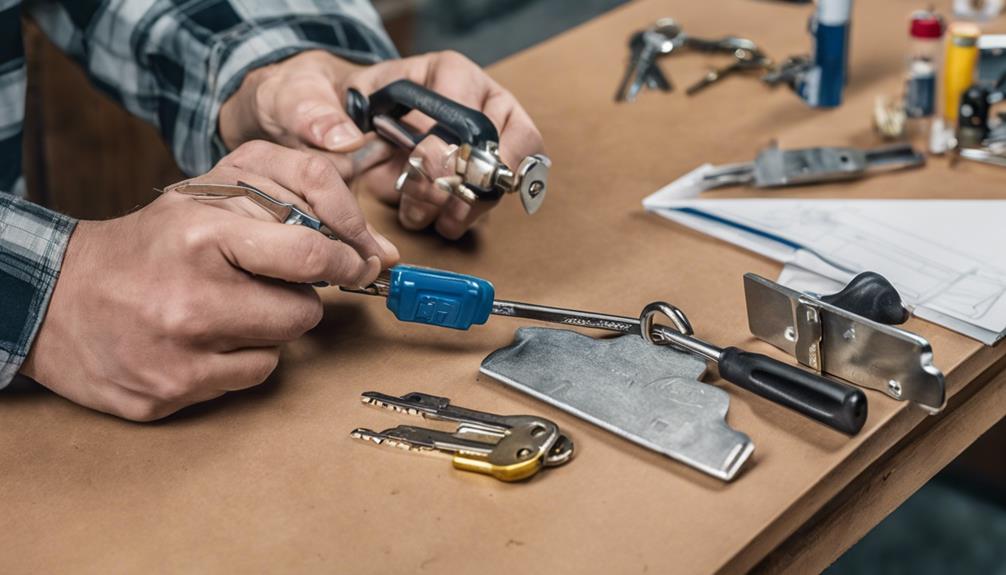When considering DIY vs. professional lock re-keying, the costs can vary greatly. DIY kits typically cost between $10 and $30, but you might spend several hours on the process, depending on your skill level. In contrast, hiring a locksmith usually ranges from $50 to $150 per lock. While DIY might save you money upfront, professional services guarantee proper execution and save you from costly mistakes. Additionally, professionals often provide guarantees on their work, which can offer peace of mind. Exploring your options further can reveal more details to help you make the best choice for your needs.
Key Takeaways
- DIY re-keying kits cost between $10 and $30, while professional locksmith fees range from $50 to $150 per lock.
- Professional services often offer free consultations, ensuring accurate budgeting and potential discounts for multiple locks.
- DIY can save money upfront but may lead to costly mistakes, such as lock malfunctions or additional repair needs.
- Hiring a professional guarantees workmanship, quality materials, and adherence to industry standards, reducing future issues.
- Time investment for DIY can exceed several hours, impacting availability for other responsibilities compared to the efficiency of professional services.
Overview of Lock Re-keying Costs
When you're considering lock re-keying, understanding the costs involved is crucial. Whether you're looking to enhance security for your home or business, knowing how much rekeying costs can help you make informed decisions.
The rekeying price guide typically shows that DIY re-keying can save you money upfront. You might spend anywhere from $10 to $30 on a rekeying kit, depending on the brand and number of locks you're working with.
Detailed breakdown of the costs involved can also provide insight into additional factors that might affect your decision.
However, when weighing the DIY vs professional rekeying cost, remember that hiring a locksmith can range from $50 to $150 per lock, depending on your location and the complexity of the job. While this might seem more expensive initially, professionals guarantee the locks are rekeyed correctly, giving you peace of mind.
Consider your skill level and the time you can dedicate to the task when deciding. If you're comfortable with tools and instructions, DIY might be the way to go.
But if you want to serve others by guaranteeing their safety, investing in a professional locksmith might be the best choice. Ultimately, the decision hinges on your priorities and circumstances.
DIY Lock Re-keying Supplies
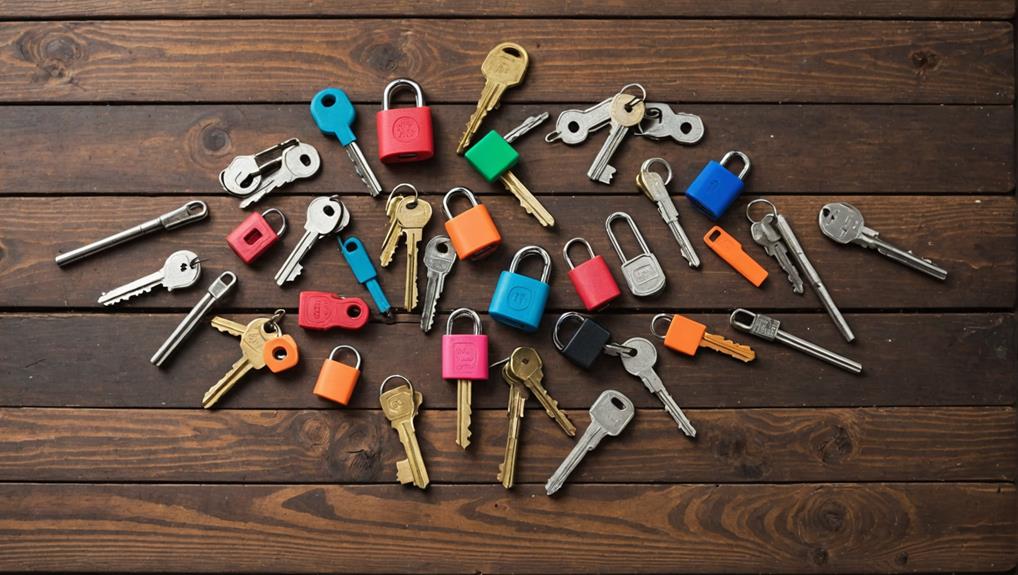
If you've decided to tackle lock re-keying yourself, gathering the right supplies is key to a smooth process. Start by getting a re-keying kit, which typically includes new pins, a key decoder, and a follower tool.
These kits vary in price, so it's wise to check the cost comparison rekeying options at your local hardware store or online. Additionally, understanding the essential tools for lock re-keying can help you make informed decisions about what to purchase.
Next, you'll need a set of screwdrivers to remove the lock from its place, as well as a pair of pliers for handling small parts. You might also want a flashlight to better see the internal components.
A workbench or sturdy surface will help keep everything organized, too.
Don't forget safety glasses to protect your eyes from flying springs and pins. Depending on the complexity of your locks, you might consider a tutorial or guide—many are available for free online.
Professional Service Fees
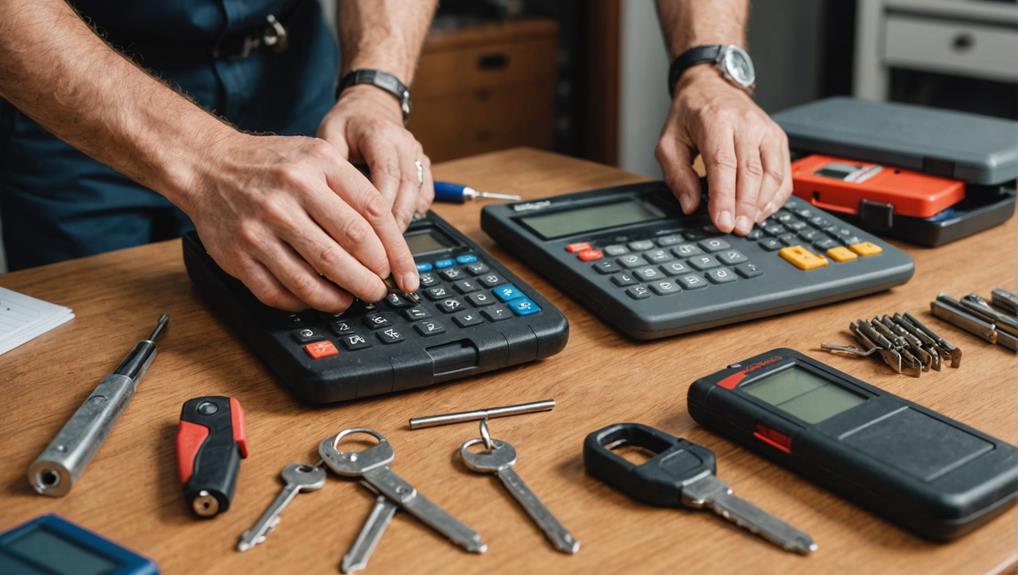
When considering professional lock re-keying, it's important to understand the average service rates you might encounter.
The cost for professional re-keying can vary greatly based on factors such as location and the complexity of the job, so it's wise to consult with a service provider for an accurate estimate.
You'll also want to be aware of any additional charges that could apply, such as travel fees or costs for extra locks. Knowing these details can help you budget effectively for your security needs.
You can also explore the professional re-keying process to gain insights on costs and benefits.
Average Service Rates
Getting a handle on professional lock re-keying service rates can save you time and money. Typically, you'll find that the average cost for a professional to re-key a single lock ranges from $20 to $50. This price can vary based on factors like location, the locksmith's experience, and the complexity of the job.
If you're considering re-keying multiple locks, some locksmiths offer discounts for bulk services, which can help you serve your community better by enhancing safety without breaking the bank.
Additionally, you might encounter a service call fee, often between $15 and $30, which covers the locksmith's travel to your location.
It's vital to get a clear estimate before proceeding to avoid any surprises. Many locksmiths provide free consultations, so don't hesitate to ask about their rates and what's included.
Additional Charges Overview
Understanding additional charges can make a significant difference in your overall costs when hiring a locksmith for re-keying services.
When you reach out to a professional, you might encounter extra fees that can catch you off guard. These could include travel fees if the locksmith has to come a significant distance, or emergency service fees if you need help outside regular business hours.
Additionally, some locksmiths charge a service call fee just for arriving at your location. It's crucial to ask about these charges upfront to avoid surprises.
If your locks have unique features or require special tools, expect to pay extra for that as well.
Don't forget about the cost of new keys; if your locksmith provides them, they may add that to your bill. You'll want to clarify how many keys are included in the service.
Time Investment for DIY
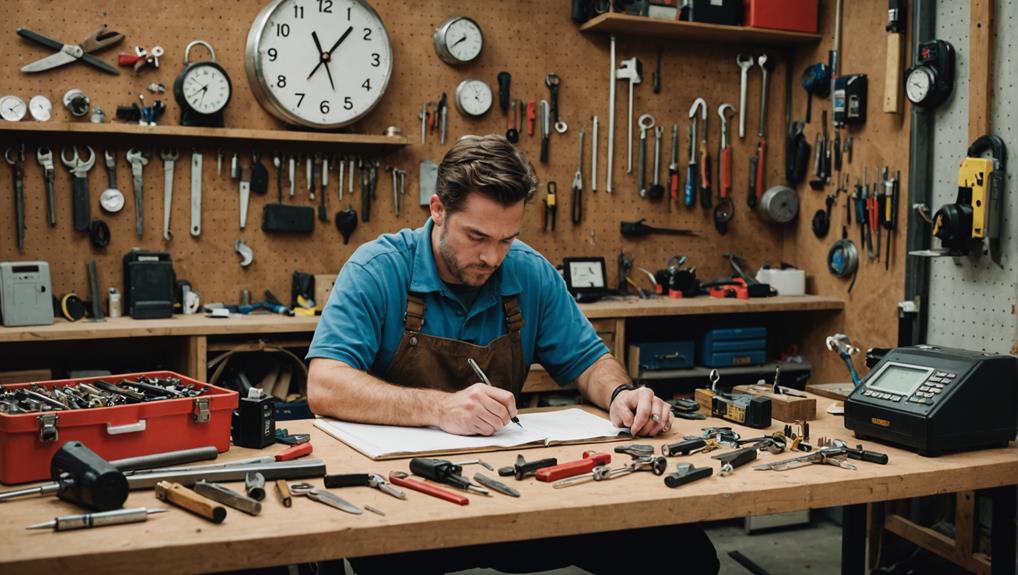
How much time are you willing to invest in a DIY lock re-keying project? It's vital to take into account the time commitment before diving in. Depending on your experience, you may need several hours to complete the task.
First, you'll need to gather tools and materials—this might take some time if you don't have everything on hand. Understanding the benefits and challenges of DIY lock re-keying can help you assess whether it's worth the time investment.
Once you have what you need, you'll spend time studying the lock mechanisms and following instructions. If you're a beginner, expect to allocate extra hours to guarantee you understand each step thoroughly. Mistakes can extend the process, so patience is imperative.
After re-keying, you'll want to test the locks to confirm they function correctly. This can take additional time, especially if you encounter any issues.
Remember, you're not just serving yourself; you're also safeguarding the safety of those around you. If you're committed to helping others feel secure, weigh your time investment carefully.
While DIY projects can be rewarding, the hours you dedicate may affect your availability for other important tasks or community engagements.
Expertise and Skill Level
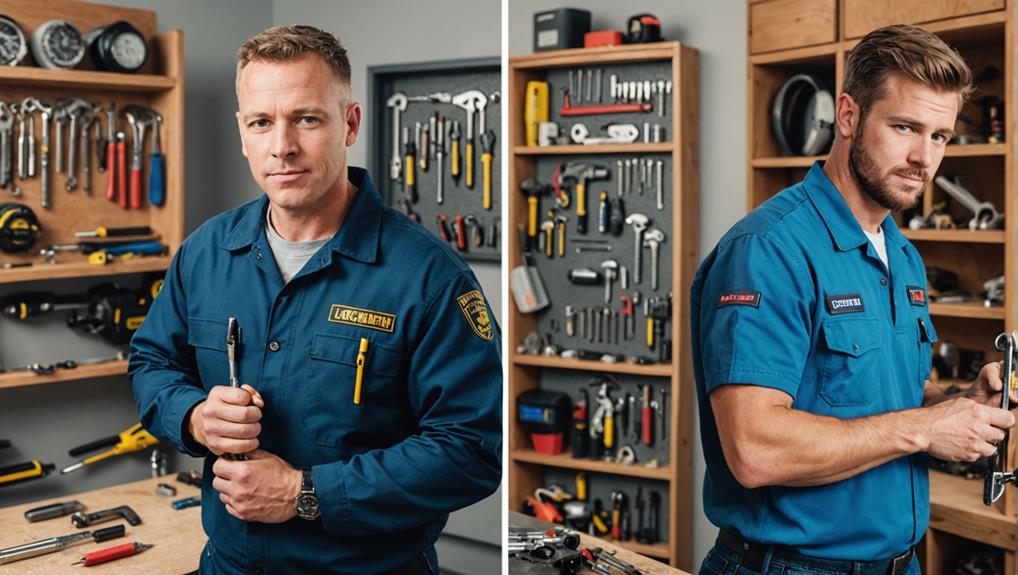
When considering lock re-keying, you need to think about the tools and equipment required for the job. A lack of proper tools can lead to complications, making it essential to evaluate whether you have access to the right resources.
Your skillset and any training you've had will play a huge role in whether you can tackle this task yourself or should call in a pro. Understanding these factors can help you make an informed decision about the DIY vs. professional re-keying options.
Required Tools and Equipment
While you might be tempted to take on a DIY re-keying project, having the right tools and equipment is vital to guarantee success. To start, you'll need a re-keying kit specific to your lock type. These kits come with necessary pins, springs, and tools designed for the job.
You'll also require a screwdriver set, as well as a pair of tweezers for handling small components. A plug follower is another important tool that helps you safely remove the lock cylinder without losing any internal parts. A flashlight can be handy, too, especially when working in dimly lit areas.
Don't forget a small container to hold those tiny pieces; losing them can complicate your re-keying efforts. Additionally, a workbench or a sturdy surface will make the task much easier. Using a vise can also help secure the lock while you work, reducing the risk of damage.
Having these tools on hand guarantees you can focus on serving your community by enhancing their security needs. Remember, being well-prepared not only boosts your confidence but also leads to a successful re-keying experience.
Skillset and Training Needed
Having the right tools is just the beginning; understanding the skillset required for re-keying locks is equally important.
Whether you're considering a DIY approach or hiring a professional, knowing the expertise needed can help you make an informed decision.
When re-keying locks, keep these essential skills in mind:
- Mechanical Aptitude: You should be comfortable handling small parts and tools, as precision is key in re-keying.
- Attention to Detail: Missing a small component can lead to security issues, so being meticulous is vital.
- Problem-Solving Skills: Challenges may arise during the process, and having the ability to troubleshoot is invaluable.
If you feel confident in these areas, DIY re-keying might be a rewarding option.
However, if you lack experience or time, a professional can guarantee the job's done correctly, providing peace of mind that your locks are secure.
Ultimately, your choice should reflect your comfort level with these skills and your desire to serve others by providing them a safe environment.
Risk of DIY Errors
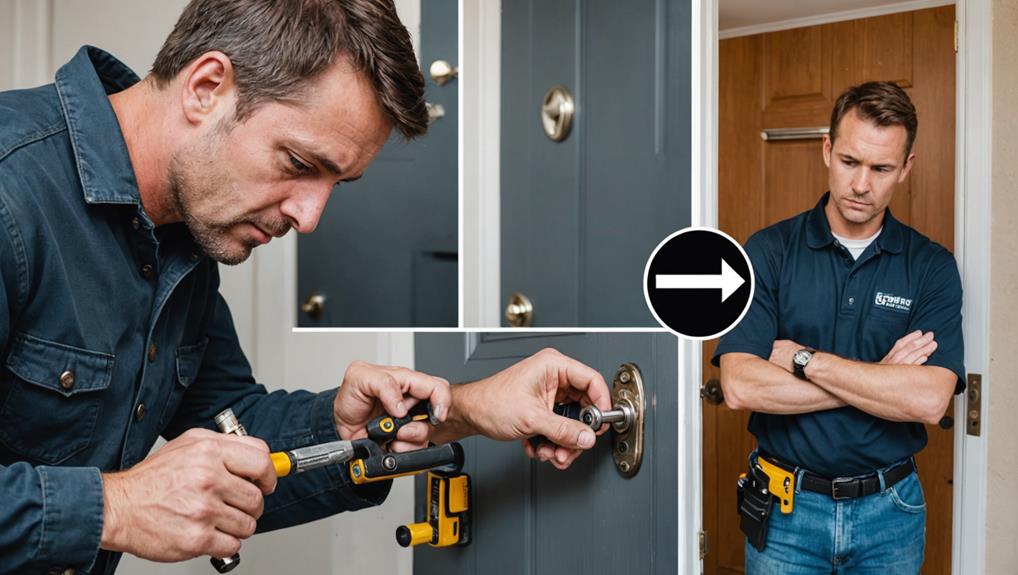
Attempting to re-key a lock on your own can lead to a range of costly mistakes. You might think you're saving money, but errors can quickly add up. For instance, if you misplace a pin or use the wrong size, you could end up with a lock that doesn't work properly. This not only compromises your security but may also force you to replace the entire lock, which is far more expensive than hiring a professional in the first place.
Furthermore, certain lock types may have intricate mechanisms that require specialized knowledge, making DIY lock re-keying a risky endeavor.
Additionally, you might inadvertently damage the lock during the re-keying process. A simple slip of your hand could lead to broken components that require costly repairs or replacements. It's crucial to recognize that even small oversights can have significant consequences, impacting both your time and your finances.
When you serve others by choosing a professional, you guarantee that the job gets done right the first time. Professionals bring expertise and experience that can save you from the pitfalls of DIY.
Ultimately, prioritizing quality over cost can lead to safer, more secure outcomes for you and those you're looking to protect.
Warranty and Guarantees
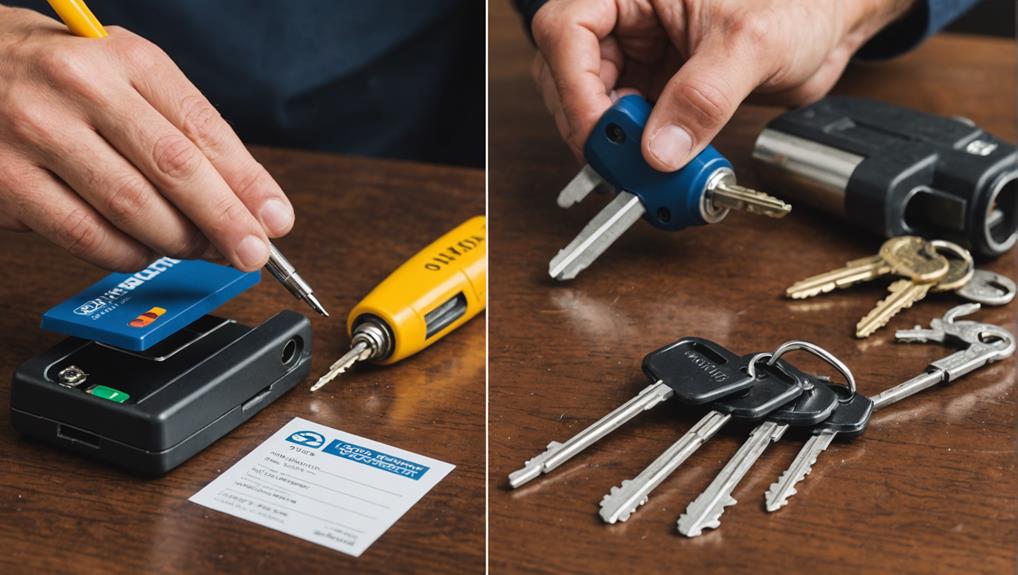
Choosing a professional for lock re-keying not only guarantees a job well done but often comes with valuable warranties and guarantees. When you hire a skilled locksmith, you can rest assured that your investment is protected.
These warranties typically cover the workmanship and the parts used, giving you peace of mind. Additionally, professional locksmiths are well-versed in the intricacies of the re-keying process, ensuring that they adhere to industry standards and best practices, which can greatly reduce the chances of future issues.
This expertise is essential for maintaining security and functionality in your locks, as outlined in understanding lock re-keying.
Here are a few benefits of choosing a professional service:
- Workmanship Guarantee: If any issues arise from the re-keying process, a professional will often return to fix it at no extra charge.
- Quality Assurance: Professionals use high-quality materials, ensuring that your locks function smoothly and securely for years to come.
- Liability Coverage: Reputable locksmiths carry insurance, protecting you from any potential damages that could occur during the re-keying process.
Long-term Cost Considerations
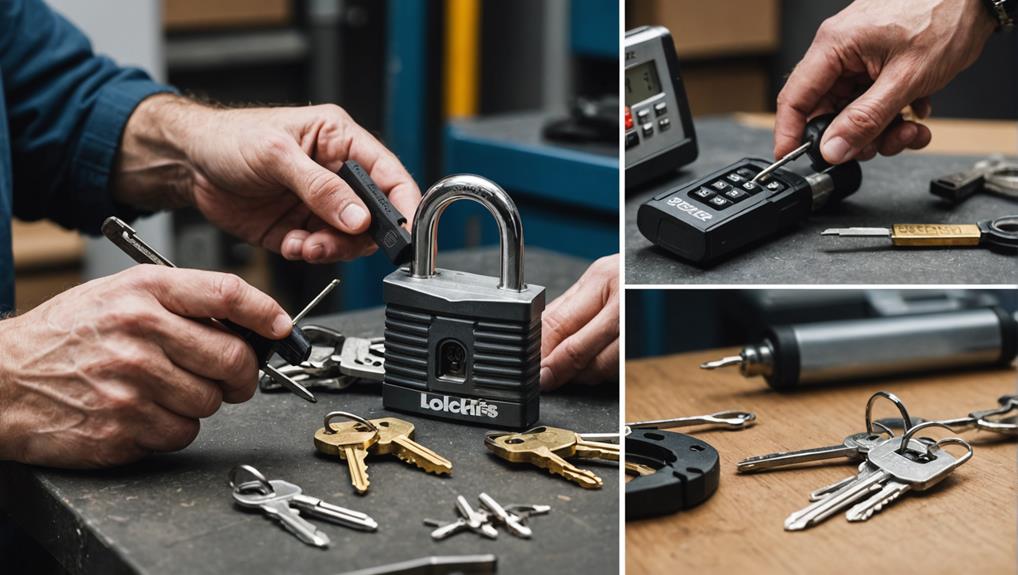
When it comes to lock re-keying, considering long-term costs can save you money down the road. While a DIY approach might seem budget-friendly initially, think about the potential hidden expenses. If you don't have the right tools or experience, you might end up needing to redo the job or even replace the locks altogether. That can quickly add up.
Furthermore, the advantages of re-keying locks highlight the importance of maintaining security without incurring excessive costs.
On the other hand, hiring a professional may come with a higher upfront cost, but their expertise often guarantees the job's done right the first time. Professionals can also provide advice on maintaining your locks, which can help you avoid future expenses related to repairs or replacements.
Additionally, consider the value of your time. If you're busy serving others, spending hours figuring out lock re-keying mightn't be the best use of your resources. A professional can handle it efficiently, allowing you to focus on what matters most.
Ultimately, investing in quality service can lead to long-term savings, peace of mind, and the confidence that your security needs are properly addressed.
Frequently Asked Questions
What Are the Signs That My Locks Need Re-Keying?
If you're noticing difficulty in turning your key or if the lock feels loose, it's time to contemplate re-keying.
You might also see signs of wear, like scratches or rust, indicating damage.
If you've lost a key or moved into a new home, re-keying can enhance your security.
Keeping your loved ones safe is a priority, so trust your instincts and act if you feel uncertain about your lock's integrity.
Can I Re-Key a Smart Lock Myself?
Can you re-key a smart lock yourself? You might be surprised at how simple it can be!
Many smart locks come with user-friendly instructions that guide you through the process. You'll need a compatible tool, usually included with your lock.
Just imagine the satisfaction of securing your home while saving money! However, make certain you follow the steps carefully to avoid any mishaps.
Your home deserves the best, and you can deliver that!
How Often Should I Consider Re-Keying My Locks?
You should consider re-keying your locks whenever you move into a new home, after a breakup, or if you lose a key.
It's also wise to re-key after someone you trust no longer needs access.
Regularly evaluating your security, especially after any significant life change, helps keep your home safe.
Don't forget to check your locks' condition too; maintenance can prevent issues down the line.
Peace of mind is worth it!
Do All Locksmiths Offer Re-Keying Services?
You might be surprised to learn that not all locksmiths offer re-keying services.
It's essential to ask before you need help. While many locksmiths do provide this service, some specialize in other areas like repairs or installations.
By checking ahead, you guarantee you find the right expert who can meet your needs.
What Tools Do Professional Locksmiths Use for Re-Keying?
When you think about what tools professional locksmiths use for re-keying, you'll find they rely on a range of specialized equipment.
They typically use a re-keying kit, which includes various pins, springs, and a key gauge.
You might also see them using a plug follower, tweezers, and a small screwdriver.
These tools help guarantee the process is efficient and precise, allowing them to provide a reliable service that keeps your locks secure.
Conclusion
In the end, deciding between DIY and professional lock re-keying is like choosing between a quick snack and a gourmet meal. While DIY can save you some cash upfront, you might face hidden costs if things go wrong. On the other hand, hiring a pro guarantees expertise and peace of mind, but it comes at a higher price. Weigh the costs against your skills and needs to make the best choice for your security.

